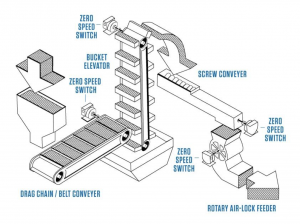
Mined industrial materials are used to make thousands of commodities: building materials, electronics, detergents, medications, plastics, ceramics, paper, glass, and many more. Some minerals are used in processes — such as bentonite for gas and oil extraction, and kaolin for fracking operations.
Many production facilities will process tons of mined materials a day. For example, Barnes Concrete Co. is a manufacturer of ready-mix concrete based in the Connecticut, New York, and New Jersey tri-state area. In just one hour, up to 250 tons of gravel are loaded into their feeders. Imagine the kind of volume in much larger companies that have more products and wider distribution.
Problems and Risks
Working with high volumes of heavy materials can cause several problems in production that can cost millions of dollars if it is not properly managed. Any failure in equipment can lead to tons of materials being spilled—causing delay and possibly injury.
If companies do not manage this risk by incorporating safety devices, they are vulnerable to serious and long-term financial and legal problems.
Safety Compliance
Regulatory bodies such as the Occupational Safety and Health Administration (OSHA) require employers to keep the workplace—whether it is the mining or the processing facility—free of serious recognized hazards.
If a plant inspection reveals negligence or failure to comply, the company can be slapped with large fines and a suspension of its business license.
Production Delays
Barnes Concrete Co.’s plant supervisor Joe Kruzewski estimates that if there were any material spills, it would take three people at least three hours to shovel one ton of gravel.
Since the feeder loads 250 tons of gravel per hour, or about four tons a minute, even a 10-minute delay in response time after a machine fails could result in 30 hours of downtime. “We would have to shovel for days!”
Worker Injury
Manually shoveling heavy material also creates another problem: worker safety. Any work that is outside of what a worker is trained and hired to do increases the risk of injury. Other minerals can also be dangerous if they are spilled, because of the weight, creation of flammable or other hazardous environments, or health problems caused by exposure to either the mineral or the chemical compounds combined with it.
Any worker accident can incur both direct and indirect costs. Direct costs include regulatory fines, hospital and litigation costs, and insurance penalties. Indirect costs can be even larger, because of loss of business contracts and long-term damage to reputation.

Manage Risks with a DAZIC® Zero Speed Switch
Barnes Concrete Co. has never had any incidents of material spills because of a simple safety device: the DAZIC Zero Speed Switch.
DAZIC Zero Speed Switches are interlocked into a conveyor system so that operations stop if any equipment runs outside of pre-set speed limits. It prevents material pile-up and all of its disastrous consequences.
They installed the DAZIC Zero Speed Switches on all of their 12 conveyors several years ago. The oldest one is 18 years old, and it is still working.
At that time, Barnes Concrete Co. was still a smaller company with a limited budget for equipment investment. However, the DAZIC Zero Speed Switches cost less than $900 each—a very affordable investment that has paid off.
“It’s really a safety issue,” said Kruzewski. “Any equipment malfunction or failure in the production line could lead to an avalanche of material. It would be a trainwreck [to be] buried with that amount of gravel.”
The speed switches have also proven to be very durable and reliable. “They have never quit. The mounting eventually fails from wear and tear, but that’s more of maintenance on our part, not from the unit failing,” says Kruzewski.
How a DAZIC works
DAZIC Zero Speed Switches are used by both small, local businesses and industry leaders that operate all across the globe.
To find more information on how DAZIC works, visit the product page, which has a simple video explaining its operations, and the different models that can meet your process needs.
You can also contact us for consultation, where we can answer your questions and customize a proposal.





Comments are closed